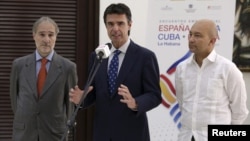European officials and businesses are visiting Cuba in unprecedented numbers, attracted by its market-oriented reforms and hastened to act by Havana's improved relations with the United States.
Seventy-five companies accompanied Jose Manuel Soria, Spain's minister of industry, energy and tourism, during his visit this week, and 140 Italian firms also visited with Italy's deputy minister for economic development, Carlo Calenda.
German Foreign Minister Frank-Walter Steinmeier was also scheduled to lead a delegation of 100 businesses to Cuba, but that trip was postponed because of ongoing talks with Iran and the crisis in Greece.
Similar delegations from France, Britain and the Netherlands have arrived in recent weeks.
"No one wants to miss the train," said Herman Portocarero, the European Union's ambassador to Cuba.
Since President Barack Obama and Cuban leader Raul Castro announced last December they would restore diplomatic ties, scores of U.S. businesses have come calling, including conglomerates such as Johnson & Johnson, Dow Chemical , Microsoft, Google, Dell and U.S. airlines.
They remain largely shut out by a U.S. economic embargo, which Obama is asking Congress to lift, so the Europeans are attempting to seize the moment while they still have an advantage.
"The crowning glory was when President Raul Castro visited Rome [in May]. He told us to hurry up and come with our companies, and we did so quickly," Mario Giro, Italy's undersecretary for foreign affairs, told reporters in Havana late Wednesday.
Italian companies have 14 projects planned for Cuba's Chinese-style special development zone around the newly built container port at Mariel, he said.
Spain is Cuba's third-largest economic partner after Venezuela and China, and its hospitality companies led by Sol Melia manage dozens of hotels on the island.
"For the government of Spain and the majority of Spanish companies, a new moment full of opportunity has begun," Soria, the Spanish industry, energy and tourism minister, said.
The Mariel economic zone was especially attractive for investors, because it allows wholly owned foreign companies to repatriate profits under a favorable tax regime, he added.





